The African delegation's 10-point peace proposal is more inspirational than a concrete plan capable of de-escalating the Russia-Ukraine conflict.
"President Cyril Ramaphosa on June 18 concluded a two-day trip to Ukraine and Russia, during which African leaders proposed a 10-point peace proposal to the 16-month conflict," the South African president's office said on the same day.
In this plan, the African delegation proposed that the leaders of Russia and Ukraine listen to each other's views; affirm that the war must be resolved through negotiations and diplomacy ; both sides must reduce the temperature of the conflict; and recognize national sovereignty according to the United Nations Charter and international principles.
The delegation's proposal also called for security guarantees for all countries involved; removal of all obstacles to the flow of grain across the Black Sea so that it can reach markets; humanitarian efforts to reach those affected; prisoners of war to be released and children to be returned to Ukraine; reconstruction of the damage caused by the war; and follow-up contacts to encourage dialogue through the African Peace Mission.
“We are here to deliver a very clear message that we want this war to end,” Ramaphosa said as the African delegation met Russian President Vladimir Putin in St. Petersburg on June 17. This was the same message the African delegation sent to Ukraine when it arrived in Kiev a day earlier.
It is important to hear the views of both sides, Ramaphosa stressed. However, judging from the responses from Putin and Ukrainian President Volodymyr Zelensky, observers say the African delegation’s efforts are unlikely to cool down the conflict in Ukraine.
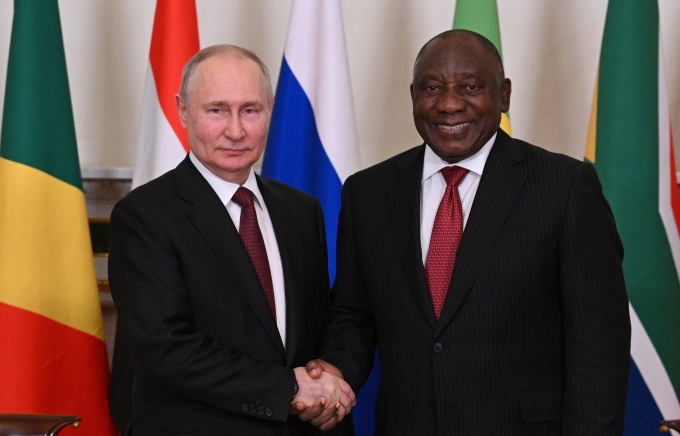
Russian President Vladimir Putin (left) shakes hands with his South African counterpart Cyril Ramaphosa in St. Petersburg on June 17. Photo: AFP
An African delegation, including the presidents of South Africa, Zambia, Comoros, Senegal, and representatives of the leaders of the Republic of Congo, Egypt, and Uganda, met with Mr. Zelensky on June 16. Mr. Zelensky emphasized that negotiations with Moscow will only take place after Russian forces withdraw from areas under their control in Ukraine.
Mr. Zelensky questioned the African delegation’s mission, asking why they had decided to go to St. Petersburg even after Russia launched a missile attack on Kiev the day they arrived in the Ukrainian capital. “Is it reasonable? I really don’t understand,” Mr. Zelensky said.
Ukraine announced on June 16 that it had shot down six Russian Kinzhal hypersonic missiles that attacked Kiev. Russia has not responded to Ukraine's accusations, but has repeatedly affirmed that it only attacked military targets, not civilian ones.
The African delegation has always maintained its neutrality in the Russia-Ukraine conflict, but Kiev is skeptical of this, especially with President Ramaphosa, whose African National Congress (ANC) has had close ties with Moscow for decades.
The relationship has drawn further attention after allegations emerged that South Africa was supplying weapons to Russia, although both Pretoria and Moscow denied the information.
“There were no expectations for the African delegation’s position when it came here,” said Hanna Shelest, a Ukrainian foreign policy analyst. The Ukrainian government had hoped that seeing the consequences of war firsthand might change African leaders’ stance.
Meanwhile, when receiving an African delegation in St. Petersburg on June 17, President Putin stressed that the Ukrainian leadership cannot be trusted. He also released a draft peace agreement agreed by Russia and Ukraine in March 2022, accusing the other side of "throwing away" the agreement after Moscow withdrew its forces from northern Kiev.
The Kremlin chief affirmed that Moscow is ready for dialogue with Kiev but no longer believes Ukraine will keep its word. "Where can we get the guarantee that they will not abandon other agreements?", President Putin asked.
In addition, Moscow has repeatedly asserted that any potential agreement requires Kiev to recognize the "new realities" on the ground, referring to Moscow's annexation of the four regions of Donetsk, Lugansk, Kherson and Zaporizhzhia into its territory. This is something that Ukraine has repeatedly rejected, declaring that it will regain these territories at all costs.
The parties have little in common to even begin preparations for negotiations, let alone the confidence-building measures that the African delegation mentioned at the start of its mission.
Observers say the 10-point proposal put forward by the South African president and his delegation is more like a guiding and inspirational set of principles than a full-fledged peace plan.
Many key points of the proposal were flatly rejected by Mr Putin, who argued that Ukraine and its Western allies had started the conflict long before Russia launched its operation in February last year.
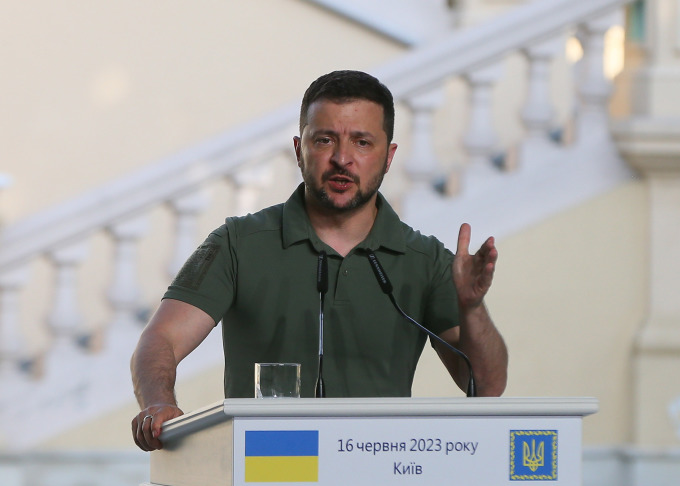
Ukrainian President Volodymyr Zelensky at a press conference with African leaders after a meeting in Kiev on June 16. Photo: AFP
The timing of the African mission is also not auspicious. Ukraine is believed to be in the midst of a long-planned major counteroffensive. Meanwhile, neither Russia nor Ukraine has suffered a major defeat on the battlefield that would force them to the negotiating table.
According to DW commentator Nick Connolly, the African delegation's trip looks more like an effort to find allies than to mediate negotiations. The reception of the delegation helps Putin strengthen his image, showing that Western efforts to isolate Russia have failed.
African leaders did not react even when Russia launched multiple missiles and drones against targets in Kiev shortly after their visit. President Zelensky did not hide his displeasure at a joint press conference on June 16 when Egyptian Prime Minister Mostafa Madbouly used the word "conflict" to describe Russia's campaign in Ukraine.
"It is naive to think that the African leaders' trip will be successful," Iqbal Jassat, executive director of the Johannesburg, South Africa-based think tank Media Review Network, told Anadolu . He said the delegation's efforts were "merely symbolic" and unlikely to produce any concrete results.
Meanwhile, Murithi Mutiga, director of Africa at the Belgium-based ICG policy institute, said that although the results and motives are not yet really specific, this is still a rare diplomatic effort and a "welcome move" in the context of Africa's desire to have a greater voice at the United Nations as well as international organizations.
Jean-Yves Ollivier, head of the UK-based Brazzaville Foundation, which is involved in preparing the African mission's efforts, said their aim was to start dialogue, rather than conflict resolution, on issues that do not directly affect the war situation and continue to develop in that direction.
One of them is the exchange of Russian-Ukrainian prisoners of war, according to Ollivier. Another is finding solutions to problems affecting Africa, such as grain and fertilizer. The Russia-Ukraine conflict has affected global grain and fertilizer supplies, increasing global food insecurity. Africa imports both of these goods and has been hit hard by the conflict.
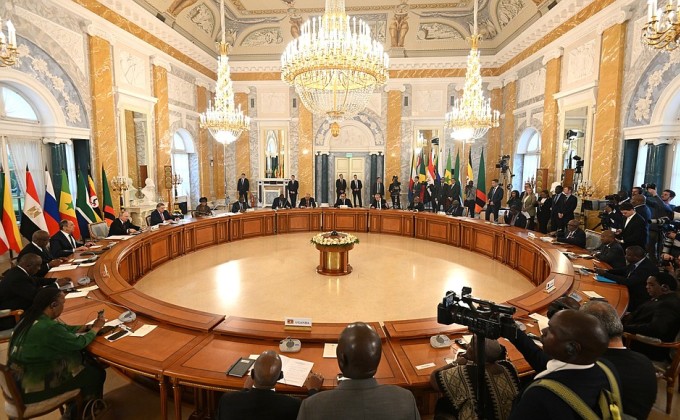
President Vladimir Putin receives an African delegation at the Konstantin Palace in St. Petersburg, Russia on June 17. Photo: RIA Novosti
Meanwhile, Professor Lesiba Teffo, University of South Africa, agreed with President Ramaphosa that the mission was a "good move" by African leaders, despite unclear results.
“There is a crisis out there. Many regions and organizations around the world are trying to stop the fighting. Why isn’t Africa stepping in and helping to end the conflict?” Mr. Teffo asked.
Whether the mission will succeed is “another matter,” he admitted, as many other proposals have failed. But Professor Teffo said the mission would help raise Africa’s profile on the world stage. “It’s better to try and fail than not to try at all,” he said.
Nhu Tam (According to DW, TASS, Anadolu )
Source link




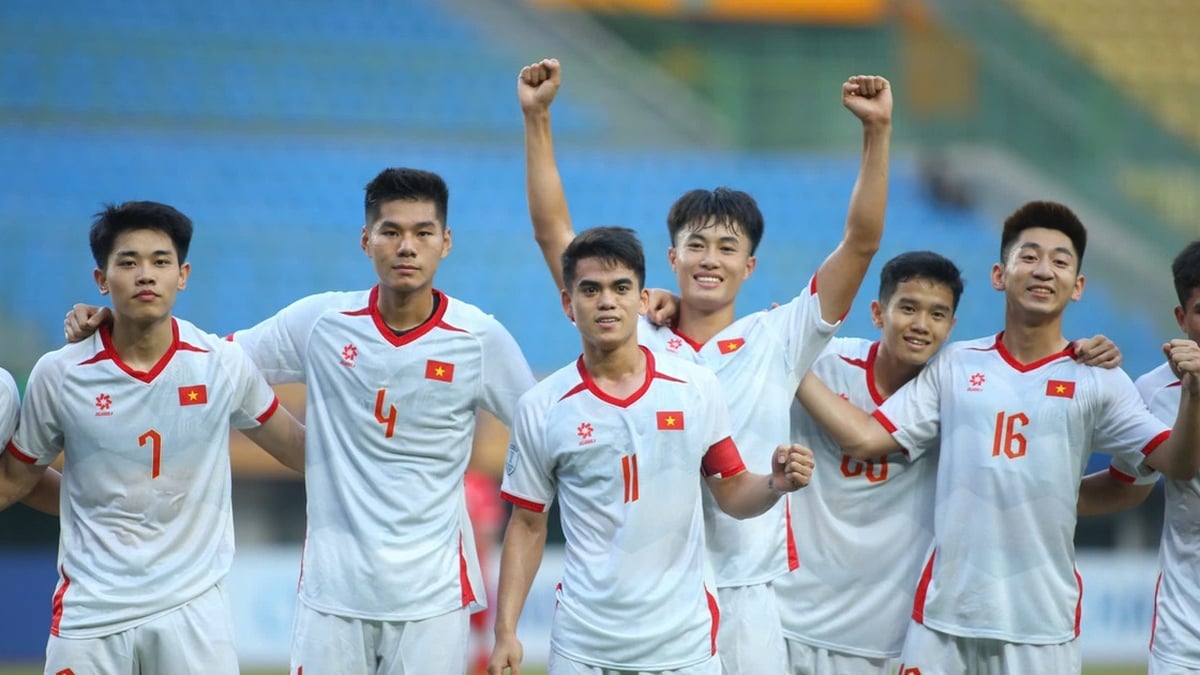

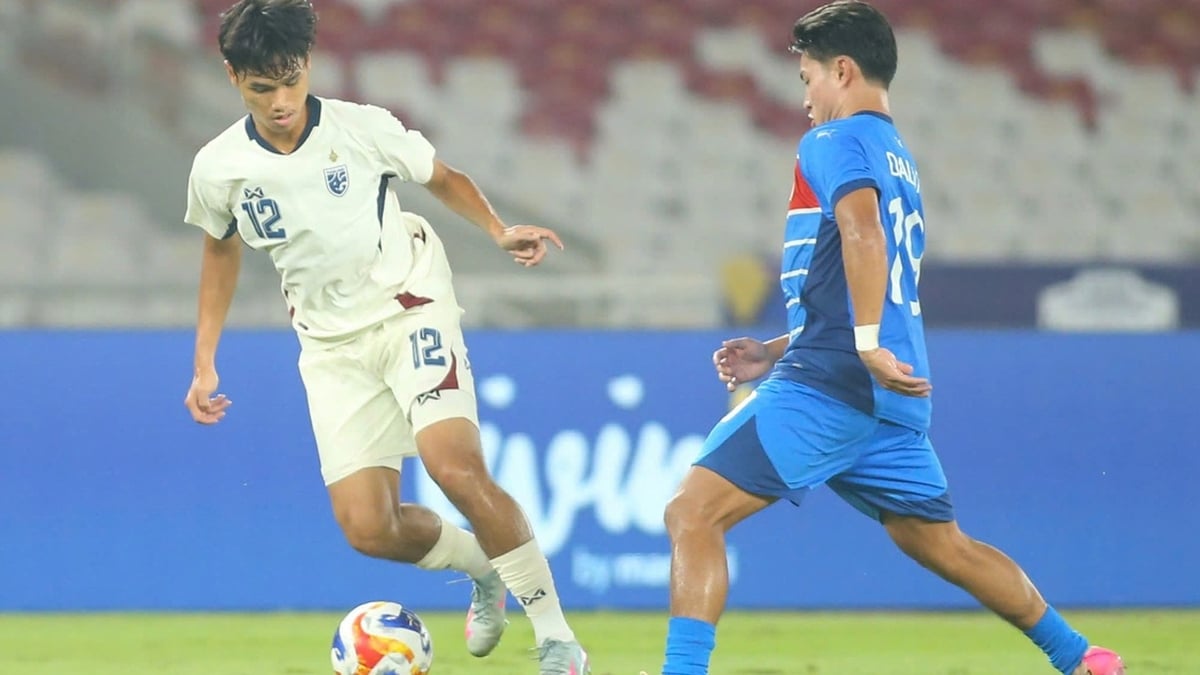


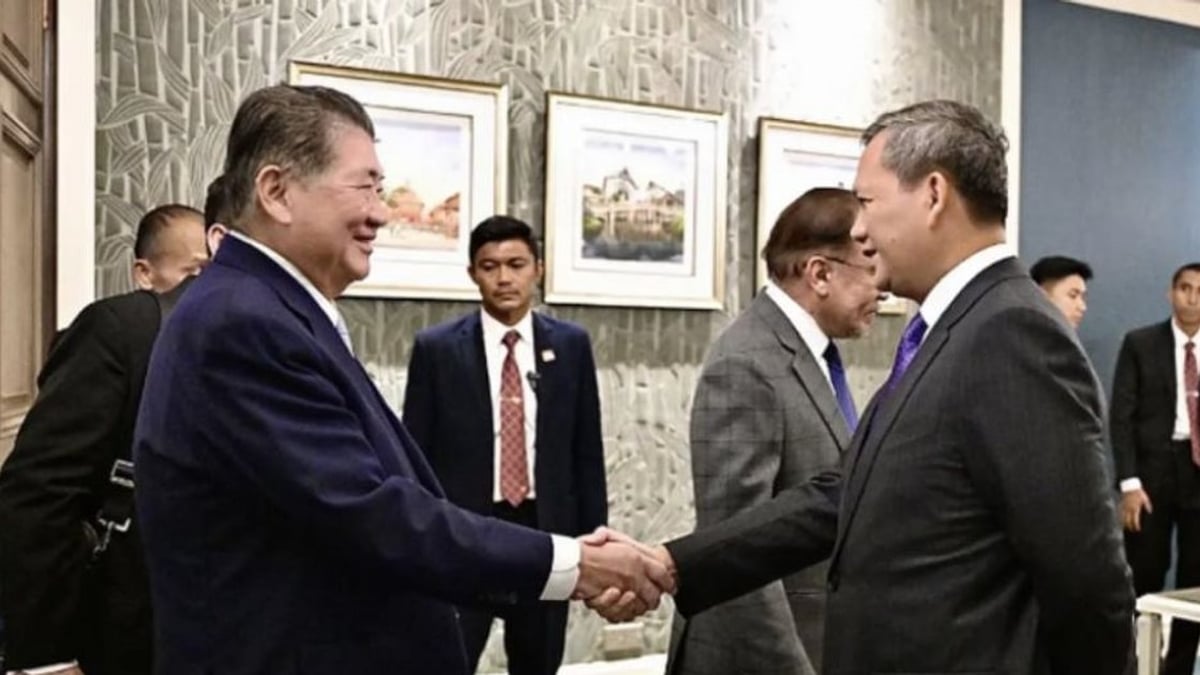

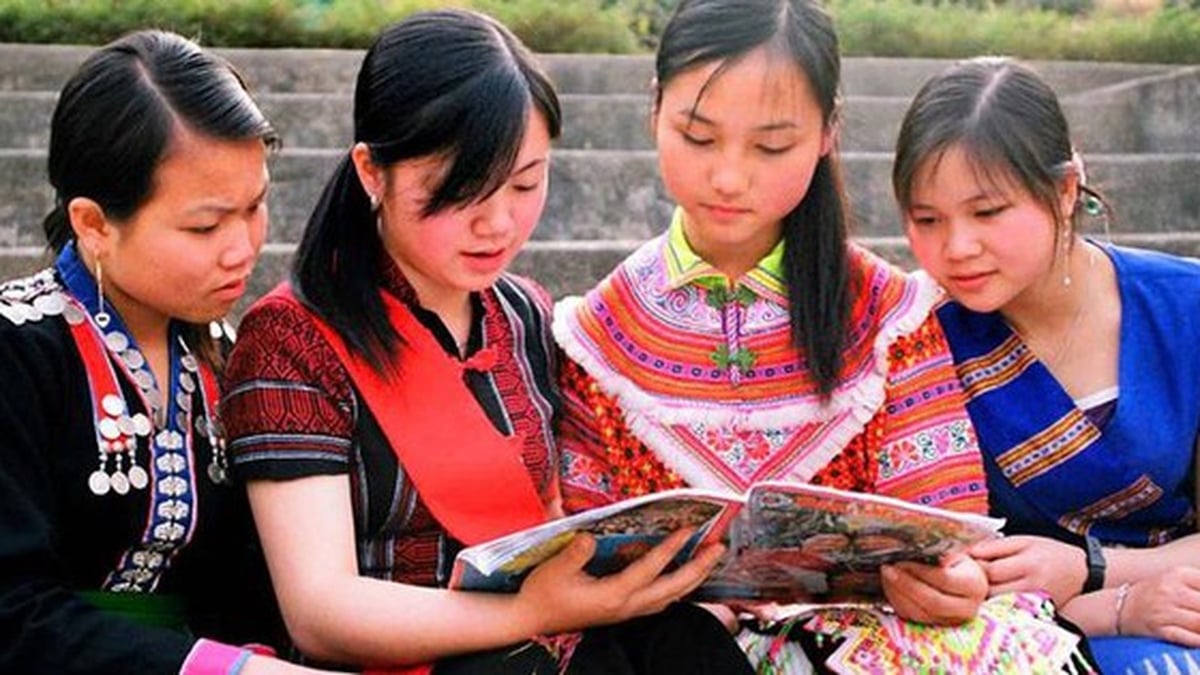

















![[Photo] National Assembly Chairman attends the seminar "Building and operating an international financial center and recommendations for Vietnam"](https://vphoto.vietnam.vn/thumb/1200x675/vietnam/resource/IMAGE/2025/7/28/76393436936e457db31ec84433289f72)







































































Comment (0)